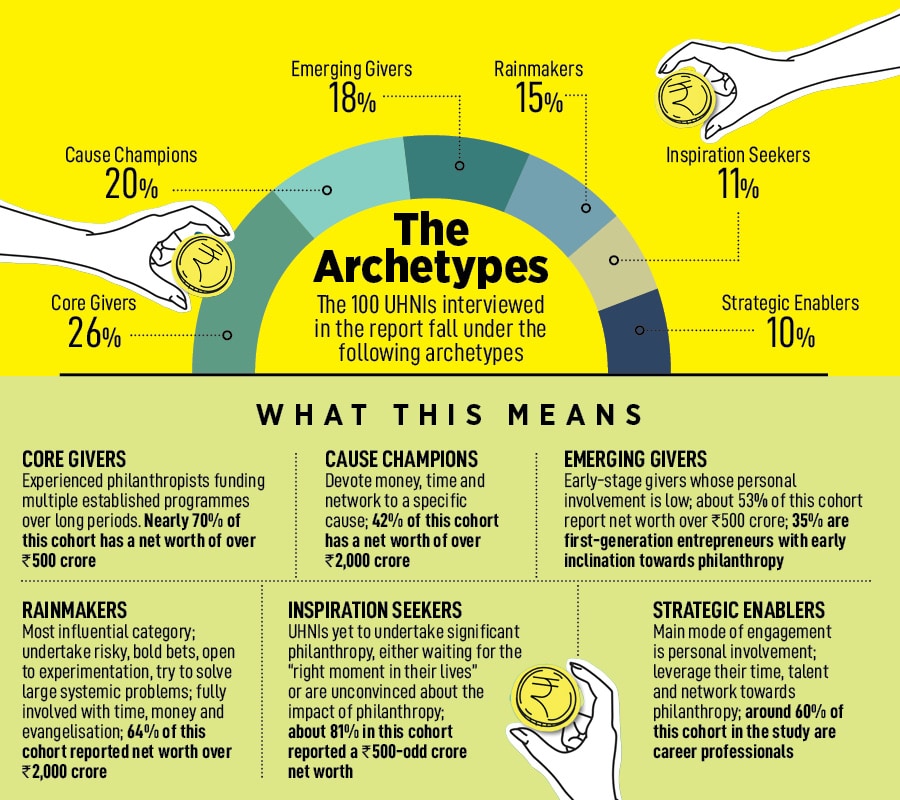Just 5 percent incremental wealth donated by the rich can contribute Rs 75,000 crore to causes annually: Report
The report by Accelerate India Philanthropy and Boston Consulting Group highlights the motivations, enablers and challenges for philanthropic giving by ultra-high-net-worth individuals in the country
 Private sector giving and personal giving cannot substitute government spending on the social sector, but the role they can fulfil is catering to niche areas that the government can’t reach
Image: Shutterstock
Private sector giving and personal giving cannot substitute government spending on the social sector, but the role they can fulfil is catering to niche areas that the government can’t reach
Image: Shutterstock
A small step from the rich can be a giant leap of support to social causes in India.
A new report says that even modest increases of about five percent in annual philanthropic allocations by ultra-high-net-worth individuals (UHNIs) can unlock an estimated Rs 75,000 crore of contributions to the social sector, which is approximately three times the current private philanthropic giving, and five times the total amount spent by India Inc through their corporate social responsibility (CSR) contributions in FY23.
“Private sector giving and personal giving cannot substitute government spending on the social sector, but the role they can fulfil is catering to niche areas that the government can’t reach, and enable systemic giving that will help make government spending more efficient and productive,” Amitabh Jaipuria, CEO, Accelerate India Philanthropy (AIP), tells Forbes India.
In India, the bulk of the social sector funding is still undertaken by the government, highlighting the urgent need for the private sector to pick up pace in backing social impact organisations. According to the India Philanthropy Report 2024 by Bain & Company and Dasra, overall social sector spending in India stood at Rs 23 lakh crore in FY23, or 8.3 percent of the gross domestic product (GDP). This falls 4.7 percent short of Niti Aayog’s annual social sector funding target.
About 95 percent of social sector funding is from the public sector, and given the surge in the Indian economy and capital markets, there is scope for private sources of funding to step up. “Personal wealth accumulation in India is surpassing global averages and there is an opportunity for philanthropy to play a much bigger role, but currently it lags behind global giving averages,” says Ashish Dhawan, founder-CEO of The Convergence Foundation, in the press release. Dhawan is among the 35-odd core founders of the Accelerate India Foundation along with other philanthropists like Rohini Nilekani, Amit Chandra, and Vishal Tulsyan.

The report identifies six different philanthropic archetypes in India (see box for details). Early engagement, increasing importance of scale, early philanthropic engagement by the new generation, support for multiple causes, and a preference for direct grant-making among evolved philanthropists are among the key emerging trends.
About 37 percent of philanthropists surveyed support three causes, followed by 29 percent supporting two causes, 16 percent support a single cause, and 11 percent and seven percent people supporting four and five causes respectively.
The TIE [treasure, involvement, evangelisation] model is used to study philanthropic giving in the report, which only considers personal wealth and not CSR contributions. According to the report, philanthropic giving is becoming more strategic, and young and first-generation wealth-creators are leading the shift. “This new wave of philanthropists is deeply involved in the causes they support, preferring to get involved more fully rather than making only financial contributions. They are also interested in funding experimental models that can lead to scalable solutions,” the report says.
Also read: The rich continue to give less than 1 percent of their wealth to philanthropy: Report
At the same time, the report also highlights that a section of wealth creators believes that by setting up and running their businesses, which create jobs and contribute to economic growth, “they are already making a significant contribution to society”. Some think that their CSR contributions sufficiently reflect their philanthropy, some want to put it off for later in life, while others either have no time for philanthropy, or have not yet found a cause that resonates with them. The other barriers to giving include information gaps, regulatory hurdles, and cultural beliefs such as preserving wealth for future generations.
Among key motivations and triggers for philanthropists is peer influence, reaching personal or financial milestones, life-altering experiences, the desire to build a legacy, and using entrepreneurial skills to solve social problems. About 63 of 100 respondents in the report said they are primarily driven by the motivation to give back to society, either directly or indirectly.
Jaipuria stresses that the growing cohort of first-generation wealth creators in the country are finding it easier to give back because they are driven by the motivation to create similar growth opportunities for others, while second-generation individuals from wealthy families are far more conscious of their privilege, and feel a sense of obligation to give back. “Philanthropy is in great hands,” he says.


















